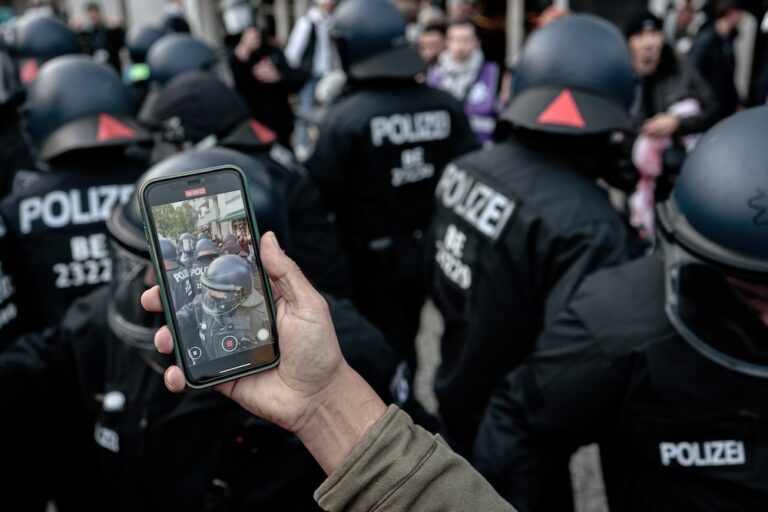(IAPA/IFEX) – On 23 January 1998 the Inter American Press Association’s (IAPA) Executive Committee expressed outrage at the murder of eight journalists in the past three months, three of them in Brazil, three others in Colombia and one each in Guatemala and Mexico. It called on the governments of those countries to do everything in […]
(IAPA/IFEX) – On 23 January 1998 the Inter American Press Association’s
(IAPA) Executive Committee expressed outrage at the murder of eight
journalists in the past three months, three of them in Brazil, three others
in Colombia and one each in Guatemala and Mexico. It called on the
governments of those countries to do everything in their power to bring the
guilty to justice and prevent any further violations of press freedom.
The hemisphere free-press group’s governing body warned that it would be
keeping a close watch on the situation, which it said “has the press in the
Americas in mourning.” It was especially concerned at reports from Brazil of
a growing tendency for the killers of newsmen literally to get away with
murder.
The IAPA leadership also renewed a call to the government of Argentina to
act to identify and prosecute the murderer of news photographer Jose Luis
Cabezas, killed on 25 January last year. The year-old unsolved case took a
new turn recently when retired Argentine naval officer Alfredo Astiz, in
defending the military’s repressive action during Argentina’s so-called
dirty war, publicly threatened politicians and journalists and dismissed
Cabezas’ murder as “no big deal.”
The IAPA Executive Committee issued its protests and warnings in a review of
violations of press freedom in the Americas over the past three months.
Among these was the Cuban government’s refusal to issue entry visas to a
number of American, Argentine and other reporters from around the world to go
to the island to cover the current historic visit there of Pope John Paul
II. The visa denial was “characteristic of an authoritarian and intolerant
regime that systematically violates the right of its own people to be freely
informed,” IAPA said.
It also strongly criticized what it had found to be discrimination by the
government of Puerto Rico in the placement of official advertising in local
newspapers. At the same time, it voiced concern at harassment of reporters
and restrictions placed upon them in seeking access to official information
during the course of their work in Puerto Rico. A recent IAPA mission to the
island confirmed complaints that such pressure was being exerted principally
by officials in the administration of Governor Pedro Rossello and were an
accentuation of such practices complained of under previous administrations.
The Executive Committee issued its protest after hearing the report of the
12-14 January mission to Puerto Rico. Press Freedom Committee Chairman
Danilo Arbilla, who headed the mission, said that, based on numerous
interviews held by the mission members and from a pile of documents they had
gathered, it was shown that “there has clearly been discrimination against
the daily “El Nuevo Dia”, from which official advertising was abruptly cut
off in 1997 in reprisal for articles it had published that the government
regarded as not favorable to it.” Such action had been taken only against
“El Nuevo Dia”, Arbilla reported. Specifically, the mission report said
that 18 government agencies, without warning, canceled their ad contracts
with the newspaper – Puerto Rico’s largest – on 14 April 1997. The contracts
were worth some $6 million, in an annual expenditure on official advertising
of $65 million. The canceled ads went to other local newspapers.
IAPA said it was surprised at a statement, made by Puerto Rican Governor
Pedro Rossello during a meeting with the mission, that he had every right to
use public funds with the same freedom as any private company. In response,
the IAPA Executive Committee urged Rossello to cease his reprisals and to
heed constitutional guarantees for the unfettered practice of journalism and
press freedom. It said it would be reviewing the situation when IAPA holds
its midyear meting in San Juan, Puerto Rico, this March.
The same issue had arisen in Nicaragua, where President Arnoldo Aleman was
also reported to be discriminating in the placement of official advertising.
In this connection, also taken up by the IAPA officers was an incident in
which the mayor of Miami, Xavier Suarez, telephoned “The Miami Herald” to
threaten to withdraw paid city announcements if the paper did not cover his
activities in the way he demanded. The Executive Committee condemned the
mayor’s action.
On the legal front, IAPA expressed its concern at the introduction of bills
in a number of legislatures around Latin America that would restrict press
freedom. “Any limitation of a free press is a direct affront to democracy,”
it declared. It cited the case of Brazil, where a bill now before Congress
would make journalists and news media found guilty of libel subject to stiff
penalties. There would be no statute of limitation, so fines and prison
terms could be handed down years after an allegedly offending article was
published. Under debate in Chile, meanwhile, was a proposed new press law,
which would make libel a criminal offense and introduce the concept of abuse
of press speech with offenders subject to payment of compensatory damages.
In this connection, IAPA reiterated its concern at the contents of Article
25 of Chile’s Law of Abuse of Advertising, which empowers courts to issue
gag orders with no time limit.
Other recent press freedom violations reported by the Press Freedom
Committee to the IAPA leadership, which brought expressions of deep concern
and repudiation included:
fire-bombed and its files ransacked following publication of reports of drug
trafficking and alleged local government corruption.
forced to flee the city in December after receiving threats. She had been
investigating the massacre of peasants in which 152 policemen had been
implicated. In November, two journalists were held hostage during a prison
riot in Santa Isabel, Para state.
Antioquia TV station, Medellin, were kidnapped and held for a week by
Colombian Revolutionary Armed Forces (FAR) guerrillas.
assaulted in November.
news items that may not favor the national government; the Uruguayan press
association complained that some journalists had been physically attacked.
IAPA’s quarterly report also detailed numerous other incidents involving
attacks on journalists or their work places in Argentina, Bolivia,
Guatemala, Paraguay, Peru, Uruguay and Venezuela.
Journalists killed in the past three months were (date of death in parenthesis):
In Brazil: Ronaldo Santana de Araujo, radio reporter, in Eunapolis, Bahia
state (09 October 1997), Edgard Lopes de Faria, radio reporter, in Campo
Grande, Matto Grosso do Sul state (29 October 1997) and Manoel Leal de
Oliveira, owner-publisher of the weekly “A Regiao, in Itabuna, Bahia state
(14 January 1998).
In Colombia: Alejandro Jaramillo, managing editor of the daily
“Diario del
Sur”, in Pasto, Narino province (24 October 1997), Francisco Castro Menco,
radio reporter, in Majagual, Sucre province (8 November 1997) and Jairo
Elias Marquez, editor of the magazine “El Marques”, in Armenia, Quindio
province (20 November 1997).
In Guatemala: Luis Ronaldo De Leon Godoy, editor of daily “Prensa
Libre’s”
weekend edition, in Guatemala City, Guatemala (14 November 1997).
In Mexico: Margarito Morales Ramirez, editor of “El Nuevo Citlan”, in
Cocula, Jalisco state (14 December 1997).
The Unpunished Crimes Against Journalists sub-committee announced that this
year IAPA will begin an investigation into the murder of journalists in
Brazil and Colombia. This will be the second stage of a major project of the
hemisphere free-press group. In the initial phase, IAPA carried out such
investigations in Colombia, Guatemala and Mexico, resulting in action being
taken to bring the guilty to justice around the world, with the UNESCO’s 186
member countries adopting a resolution to this effect, known as Resolution
120, at the world body’s General Conference last November. In it,
governments pledge to create mechanisms and adopt other measures to stop
those guilty of crimes against news men and women from literally getting
away with murder. Similar concerted action is under review by the
Organization of American States thanks to the IAPA initiative.
An IAPA mission will travel to Washington, D.C., on 25 February to meet
with the Inter-American Commission on Human Rights. They will discuss
procedures the Commission will use to appoint a special rapporteur to deal
with violations of press freedom and follow up investigations into still
unsolved murders of journalists in the Western Hemisphere.
IAPA also announced that it will hold a hemisphere conference on freedom of
expression in Costa Rica in August, as a follow-up to the Declaration of
Chapultepec, drafted by IAPA in 1994, which sets out 10 fundamental
principles for press freedom and free speech.


